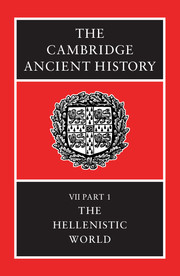Book contents
- Frontmatter
- 1 Sources for the period
- 2 The succession to Alexander
- 3 Monarchies and monarchic Ideas
- 4 The formation of the Hellenistic kingdoms
- 5 Ptolemaic Egypt
- 6 Syria and the East
- 7 Macedonia and Greece
- 8 Cultural, social and economic features of the Hellenistic world
- 9 Hellenistic science: its application in peace and war
- 10 Agathocles
- 11 The Syrian-Egyptian Wars and the new lingdoms of Asia Minor
- 12 Macedonia and the Greek leagues
- BIBLIOGRAPHY
- Index
- Map 3. Egypt.
- Map 4. Hellenistic Asia.
- Map 5. The Greek mainland and the Aegean.
- References
1 - Sources for the period
Published online by Cambridge University Press: 28 March 2008
- Frontmatter
- 1 Sources for the period
- 2 The succession to Alexander
- 3 Monarchies and monarchic Ideas
- 4 The formation of the Hellenistic kingdoms
- 5 Ptolemaic Egypt
- 6 Syria and the East
- 7 Macedonia and Greece
- 8 Cultural, social and economic features of the Hellenistic world
- 9 Hellenistic science: its application in peace and war
- 10 Agathocles
- 11 The Syrian-Egyptian Wars and the new lingdoms of Asia Minor
- 12 Macedonia and the Greek leagues
- BIBLIOGRAPHY
- Index
- Map 3. Egypt.
- Map 4. Hellenistic Asia.
- Map 5. The Greek mainland and the Aegean.
- References
Summary
From the hundred years following Alexander's death the work of no single contemporary historian has survived other than fragmentarily. Yet the period had been fully covered both in universal histories and in specialized works dealing with particular kings, peoples or regions. In the latter category there are forty-six authors known to have written about the Hellenistic period: all are lost. On the causes of this holocaust one can only speculate. Most works had of course been written in the contemporary Greek idiom (the so-called koine), which did not appeal to later scholars (and copyists). Then again, many works may never have existed in sufficient numbers of copies to render them safe against the ravages of time; this was especially likely to be true of local historians. But above all the sheer bulk and length of many works alienated the average reader, and the appearance of résumés, abridgements and even lists of contents created the conditions for a kind of literary Gresham's law to operate, so that the inferior products drove the original out of circulation and hence eventually out of existence.
The disappearance of primary sources is the main problem for the historian of the third century. But there are others. The years from 323 to 217 saw an unparalleled expansion of the Greek world as a result of which Greeks, Macedonians and the peoples of Asia Minor were brought into close contact with the inhabitants of Egypt, Phoenicia, Palestine, Mesopotamia, Iran and central Asia. Everywhere Greeks settled and established a modus vivendi of some kind or other with the original populations.
Keywords
- Type
- Chapter
- Information
- The Cambridge Ancient History , pp. 1 - 22Publisher: Cambridge University PressPrint publication year: 1984
References
- 16
- Cited by

